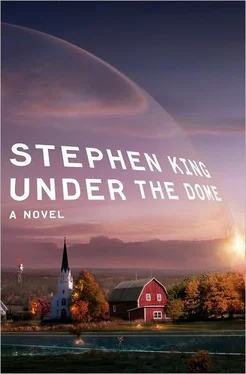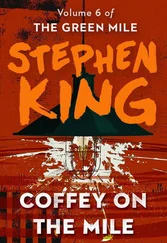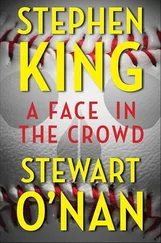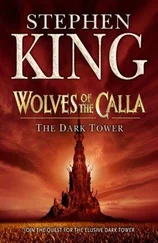Earlier that morning, perhaps fifteen percent of the town was wearing blue “solidarity” armbands; by sundown on this Wednesday in October, it will be twice that. When the sun comes up tomorrow, it will be over fifty percent of the population.
Denial gives way to acceptance; acceptance breeds dependence. Anyone who’s ever cared for a terminal patient will tell you that, too. Sick people need someone who will bring them their pills and glasses of cold sweet juice to wash them down with. They need someone to soothe their aching joints with arnica gel. They need someone to sit with them when the night is dark and the hours stretch out. They need someone to say, Sleep now, it will be better in the morning. I’m here, so sleep. Sleep now. Sleep and let me take care of everything.
Sleep.
Officer Henry Morrison got Junior to the hospital—by then the kid had regained a soupy semblance of consciousness, although he was still talking gibberish—and Twitch wheeled him away on a gurney. It was a relief to see him go.
Henry got Big Jim’s home and Town Hall office numbers from directory assistance, but there was no answer at either—they were landlines. He was listening to a robot tell him that James Rennie’s cell-phone number was unlisted when the jetliner exploded. He rushed out with everyone else who was ambulatory and stood in the turnaround, looking at the new black mark on the Dome’s invisible surface. The last of the debris was still fluttering down.
Big Jim was indeed in his Town Hall office, but he had killed the phone so he could work on both speeches—the one to the cops tonight, the one to the entire town tomorrow night—without interruption. He heard the explosion and rushed outside. His first thought was that Cox had set off a nuke. A cotton-picking nuke! If it broke through the Dome, it would ruin everything!
He found himself standing next to Al Timmons, the Town Hall janitor. Al pointed north, high in the sky, where smoke was still rising. It looked to Big Jim like an antiaircraft burst in an old World War II movie.
“It was an airplane!” Al shouted. “And a big one! Christ! Didn’t they get the word?”
Big Jim felt a cautious sense of relief, and his triphammering heart slowed a bit. If it was a plane… just a plane and not a nuke or some kind of super-missile…
His cell phone tweeted. He snatched it from the pocket of his suit coat and snapped it open. “Peter? Is that you?”
“No, Mr. Rennie. Colonel Cox here.”
“What did you do?” Rennie shouted. “What in God’s name did you people do now?”
“Nothing.” There was none of the former crisp authority in Cox’s voice; he sounded stunned. “It was nothing to do with us. It was… hold on a minute.”
Rennie waited. Main Street was full of people staring up into the sky with their mouths gaped open. To Rennie they looked like sheep dressed in human clothing. Tomorrow night they would crowd into the Town Hall and go baaa baaa baaa, when’ll it get better? And baaa baaa baaa, take care of us until it does. And he would. Not because he wanted to, but because it was God’s will.
Cox came back on. Now he sounded weary as well as stunned. Not the same man who had hectored Big Jim about stepping down. And that’s the way I want you to sound, pal, Rennie thought. Exactly the way.
“My initial information is that Air Ireland flight 179 has struck the Dome and exploded. It originated in Shannon and was bound for Boston. We already have two independent witnesses who claim to have seen a shamrock on the tail, and an ABC crew that was filming just outside the quarantine zone in Harlow may have gotten… one more second.”
It was much more than a second; more than a minute. Big Jim’s heart had been slowing toward its normal speed (if a hundred and twenty beats per minute can be so characterized), but now it sped up again and took one of those looping misbeats. He coughed and pounded at his chest. His heart seemed almost to settle, then went into a full-blown arrhythmia. He felt sweat pop on his brow. The day, formerly dull, all at once seemed too bright.
“Jim?” It was Al Timmons, and although he was standing right beside Big Jim, his voice seemed to be coming from a galaxy far, far away. “You okay?”
“Fine,” Big Jim said. “Stay right there. I may want you.”
Cox was back. “It was indeed the Air Ireland flight. I just watched ABC’s streamed footage of the crash. A reporter was doing a stand-up, and it occurred right behind her. They caught the whole thing.”
“I’m sure their ratings will go up.”
“Mr. Rennie, we may have had our differences, but I hope you’ll convey to your constituents that this is nothing for them to worry about.”
“Just tell me how a thing like that—” His heart looped again. His breath tore in, then stopped. He pounded his chest a second time—harder—and sat down on a bench beside the brick path which ran from the Town Hall to the sidewalk. Al was looking at him instead of at the crash scar on the Dome now, his forehead furrowed with concern—and, Big Jim thought, fright. Even now, with all this happening, he was glad to see that, glad to know he was seen as indispensable. Sheep need a shepherd.
“Rennie? Are you there?”
“I’m here.” And so was his heart, but it was far from right. “How did it happen? How could it? I thought you people got the word out.”
“We’re not positive and won’t be until we recover the black box, but we’ve got a pretty good idea. We sent out a directive warning all commercial air carriers away from the Dome, but this is 179’s usual flight path. We think someone neglected to reprogram the autopilot. Simple as that. I’ll get you further details as soon as we get them here, but right now the important thing is to quell any panic in town before it can take hold.”
But under certain circumstances, panic could be good. Under certain circumstances, it could—like food riots and acts of arson—have a beneficial effect.
“This was stupidity on a grand scale, but still just an accident,” Cox was saying. “Make sure your people know that.”
They’ll know what I tell them and believe what I want them to, Rennie thought.
His heart skittered like grease on a hot griddle, settled briefly into a more normal rhythm, then skittered again. He pushed the red END CALL button without responding to Cox and dropped the phone back into his pocket. Then he looked at Al.
“I need you to take me to the hospital,” he said, speaking as calmly as he could manage. “I seem to be in some discomfort here.”
Al—who was wearing a Solidarity Armband—looked more alarmed than ever. “Accourse, Jim. You just sit right there while I get my car. We can’t let anything happen to you. The town needs you.”
Don’t I know it, Big Jim thought, sitting on the bench and looking at the great black smear on the sky.
“Find Carter Thibodeau and tell him to meet me there. I want him on hand.”
There were other instructions he wanted to give, but just then his heart stopped completely. For a moment forever yawned at his feet, a clear dark chasm. Rennie gasped and pounded his chest. It burst into a full gallop. He thought at it: Don’t you quit on me now, I’ve got too much to do. Don’t you dare, you cotton-picker. Don’t you dare.
“What was it?” Norrie asked in a high, childish voice, and then answered her own question. “It was an airplane, wasn’t it? An airplane full of people.” She burst into tears. The boys tried to hold their own tears back, and couldn’t. Rommie felt like crying himself.
Читать дальше











